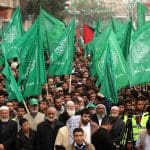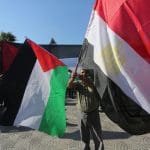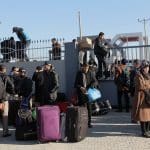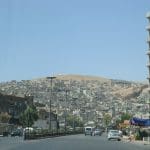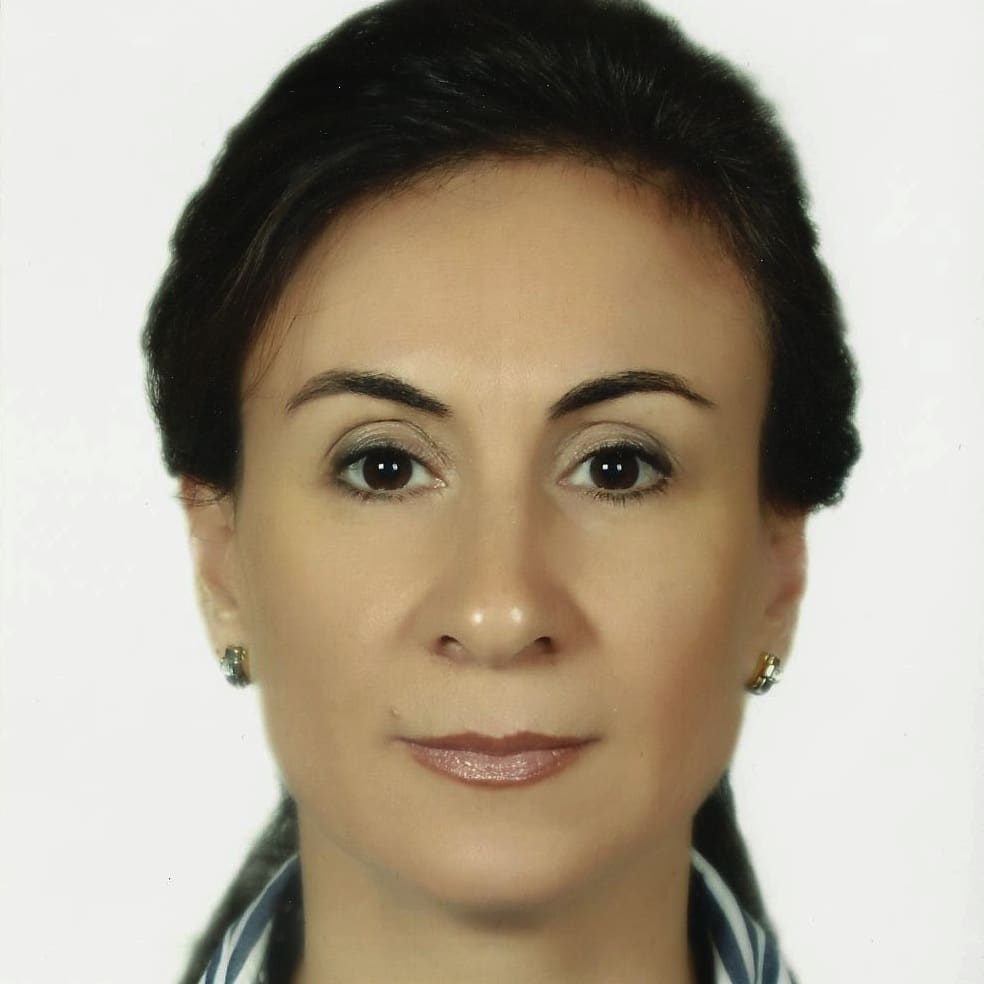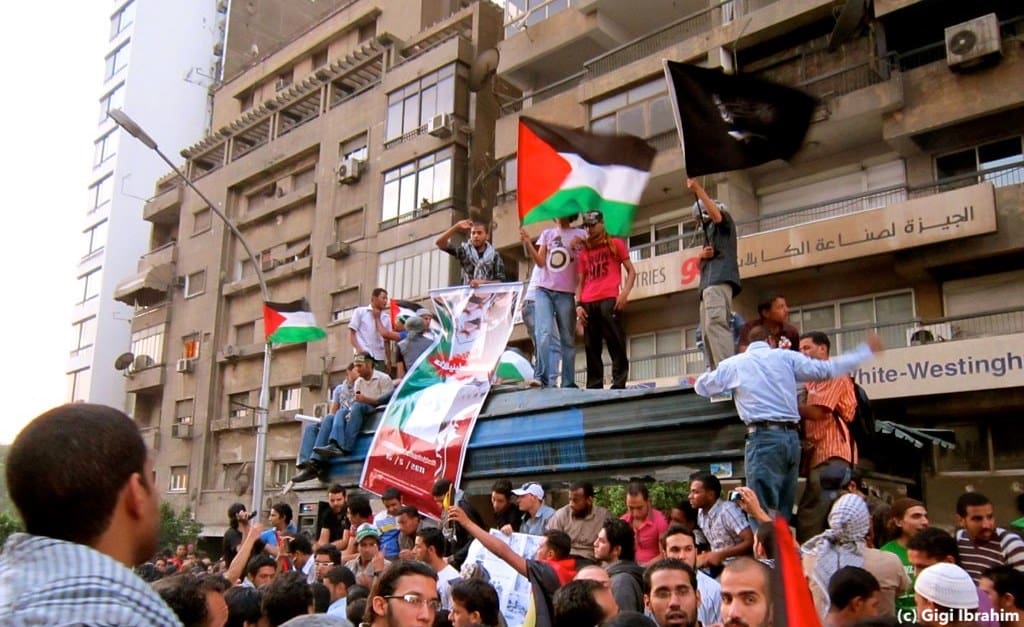
Overview
Little has been written about Palestinians in Egypt. The few thousand who sought refuge in Egypt after the 1948 Nakba were not welcomed by King Farouq’s government. However, with Gamal Abdel Nasser’s rise to power, Palestinians came to be treated on par with citizens of Egypt, enjoying basic rights, employment in the public sector, and property rights. After 1978 they were denied the rights once afforded to them by the Egyptian state as well as their rights as refugees. In this policy brief, Oroub El-Abed examines the legal status of Palestinians in Egypt, including positive signs of change in the wake of the Egyptian revolution. She argues that the Egyptian government must do more in order to live up to its responsibilities to this “invisible community,” whose numbers are unknown but who may be as many as 80,000.
Background
Roughly 15,500 Palestinians arrived in Egypt between 1948 and 1960.1 Temporary camps were created to host the Palestinian influx as a result of the 1948 Nakba, in which Palestinians fled from or were expelled by Zionist militias during the creation of the state of Israel. Some sought sanctuary in Egypt for its proximity, others because of established social and professional networks. Following the military debacle of the 1948 Palestine War, Egypt’s King Farouq did not welcome the Palestinian refugees. The three camps created in 1948 were dismantled within four years.2 In addition, many Palestinians were returned to Gaza while it was under Egyptian administrative and military rule.3 Those who remained in Egypt required an Egyptian guarantor to facilitate their stay, typically in the form of a business partner or a family connection.
Farouq’s policies were overturned by the 1952 Free Officers Coup and President Gamal Abdel Nasser’s Pan Arabist policies. After 1952, Palestinians living in Gaza were invited to Egypt to study, work and own property and were treated like Egyptian citizens. Under Nasser, children of Palestinians living in Egypt and in Gaza were able to enroll in public schools and benefit from discounted university fees. Later, this would also include employees and fighters with the Palestine Liberation Organization (PLO) and former Palestinian employees of Egyptian government bodies. After the June 1967 War and Israel’s occupation of the rest of Palestine, Syria’s Golan Heights, and the Sinai Peninsula, Palestinians living in Egypt were unable to return to Gaza. By 1969, Palestinians in Egypt numbered 33,000.
Protracted Invisibility
Palestinians are dispersed throughout Egypt’s major cities (Cairo, Sharqieh, Qalyubieh, Alexandria, Port Said, Ismailia, al-Arish, and Rafah).4 With the exception of those living in al-Waily and Ain Shams in Cairo,al-Qanayat, Faqus, Abu Fadel and al-Arish (to mention a few known communal groupings of Palestinians), Palestinians in Egypt have seldom lived in exclusively Palestinian communities. In most cases, they mixed with Egyptian society and interacted socially, professionally and culturally with Egyptians. Over time and due to intermarriage, it has become difficult to differentiate Palestinians from Egyptians. This has made it challenging for humanitarian and development intervention programs to assist the Palestinian community.
Most importantly, Egypt’s constraining policies did not permit Palestinians to create their own local community bodies. Indeed, the two major Palestinian unions have had a political-administrative role, rather than a representative one. The Palestinian Labor Union is limited to registering Palestinians as wage laborers, taxi drivers or farmers so that they can secure renewal of their residency. Meanwhile, the Palestinian Women’s Union conducts some cultural and charitable activities for a limited number of Palestinians in Egypt.
Although Nasser’s policies facilitated Palestinian integration in Egypt, naturalizing Palestinians was never an option in light of the Arab League’s 1952 resolutions regarding the need to preserve Palestinian identity and restore their basic rights.5 For example, Article 1 of the Arab League’s Resolution 462 advised Arab governments to defer efforts to settle Palestinian refugees and called on the United Nations to implement the resolutions concerning their repatriation and compensation for damages and property losses. Article 2, recommended that the host countries endeavor to improve the refugees’ living conditions and coordinate with UN Relief and Works Agency (UNRWA) to create work projects for Palestinians.6 It also confirmed that these projects should not aim for the permanent settlement of Palestinians and should preserve their right of return and compensation for their losses. Article 3 required Arab governments to coordinate efforts for facilitating the travel of Palestinians and to cooperate in accommodating their temporary stay in host countries.7
Victimized by State Politics
Although Egypt played an important role in the birth of the PLO, the political tensions between the organization and the Egyptian government over the years have had negative consequences on Palestinians in the country. After the Camp David peace agreement between Egypt and Israel was signed and the assassination of Egyptian culture minister Yusif al-Sibai in Nicosia on 18 February 1978 by the renegade Abu Nidal (Sabri El-Banna) Organization, Palestinians suffered a significant reversal of the rights they hitherto enjoyed. At al-Sibai’s funeral, then Egyptian Prime Minister Mustafa Riyad declared that, “No more Palestine after today.”8
From 1978 to 1982, all articles and regulations were changed and Palestinians were considered “foreigners” by the state except for those with privileges such as the Palestinians working for the PLO. Palestinians were also stripped of rights to reside in Egypt, with the exception of those who were married to an Egyptian, enrolled and paying fees at school or university, had a contract in a private sector firm, or had business or investments in the country.9
Free basic education stopped being an option for Palestinians who had to pay private school fees as well as university fees (to be paid in British pounds sterling).10 Work in the private sector became a privilege, for those who were able to obtain a university education and able to compete for the 10 percent quota for foreigners of total workforce of any enterprise.11 The informal sector of Egypt’s economy accommodated the majority of Palestinians registered as farmers or wage laborers through the Palestinian Labor Union.12 As registered laborers, Palestinians are also eligible for residency.
Travel was also constrained. To ensure re-entry into Egypt, Palestinians holding an Egyptian travel document that travelled or resided abroad were required to either return to Egypt every six months or provide the Egyptian authorities in advance with proof of employment or enrolment in an educational institution. In such cases, a one-year return visa could be granted.
Moreover, in times of aggravated political relations such as the 1991 Gulf War and the PLO’s open support of Iraq, the Egyptian government imprisoned Palestinian activists with greater frequency. The Egyptian media also played a role in engendering the divide by portraying the Palestinians as responsible for their own tragedy. Palestinians in the media were labelled as “disloyal,” a charge that was emphasized after al-Sibai’s assassination and renewed with every new political conflict.
Furthermore, Emergency Law 162 of 1958 gave the authorities extensive powers to suspend basic liberties, including banning demonstrations and public meetings, arresting and detaining suspects without trial for prolonged periods, and using state security courts. Under the Emergency Law, the activities of Palestinians were also strictly regulated, sweeping arrests made, and surveillance sanctioned. Even the unions connected to the PLO, which were created with the express approval of the Egyptian state, were required to obtain permits whenever they hosted events. When such events were held, state security personnel were posted at the door and could often be seen taking notes throughout the gathering. This intrusive security atmosphere made Palestinians suspicious of each other, and afraid of being reported to the authorities, especially by other Palestinians.
In response, many Palestinians avoided revealing their origins to escape harassment. Contrary to Egypt’s pledge to preserve Palestinian identity, the fact that many Palestinians feel compelled to hide their identity affected the construction of social networks and the sense of community within the country. When combined with a legal status that ensured Palestinians were kept in limbo, the aggressive monitoring by state security ensured that the Palestinian community lived in constant fear.
Marriage to an Egyptian, especially for young Palestinian men and women, has become a means of legalizing their stay in Egypt. This persists even though Palestinian men married to Egyptian women only secure residency rights. In 2004, a revision to the Nationality Law guaranteed automatic Egyptian citizenship to all children of mixed Palestinian-Egyptian marriages born after the law was enacted.
Recommendations
There are signs that the post-Mubarak government has taken some action to improve matters. On May 2, 2011, the new Interior Minister Mansour el-Eisawei approved decision Number 1231, which amended the Nationality Law making it applicable to all children of Egyptian women (including those born before 2004).13 The new decision, if implemented justly and fairly, will naturalize the majority of Palestinians whose fathers married Egyptian women in order to circumvent the impediments to legal residency imposed by the state since 1978. However, Egypt needs to do much more.
Due to the paucity of research on the Palestinians in Egypt, a study to determine the actual number of Palestinians in the country, their location, and their socioeconomic conditions is required.14 Being dispersed, invisible, and often with vulnerable living conditions, little is known about their needs and their demands.
The provision of services in Egypt by local and international donors has focused on serving Egyptian nationals. Except for health care provided by mosque-affiliated clinics to everyone, Palestinians have not been able to access humanitarian or development programs in areas where they live. Steps to include the few Palestinians in each geographic area in these services could have a significant impact on the lives of this underserved community. The agencies of the Egyptian government must be actively involved in identifying this small refugee community that constitutes a mere 0.1 percent of the country’s population. This would enable targeted development projects to be implemented to include the Palestinian community.
Egypt, like some Arab host countries, promised to ensure basic rights for Palestinians in 1952 to preserve Palestinian identity and enable development. However, Palestinians living in Egypt became the victims of political differences between the PLO and the Egyptian government. Most importantly, the Egyptian government distorted its pledge to preserve Palestinian identity. Egypt must now honor its original pledge to ensure the basic rights of Palestinians are met, their residency rights are secured, and to help them fulfill their right of return.
However, if Egypt in the post-Mubarak era is still unwilling to guarantee the basic rights of Palestinians then it is incumbent on the United Nations High Commissioner for Refugees (UNHCR) in Egypt to provide protection and assistance to Palestinian refugees. These refugees, living outside UNRWA operation areas, are ipso facto entitled to the UNHCR’s mandate and fall under its inclusive clause of article 1D of the 1951 refugee convention.15
The establishment of both basic rights and refugee rights would create an environment in which community-based organizations could flourish. Regional and international bodies would also be able to fund and support these organizations and shed light on this invisible community, help determine its needs, and realize its aspirations.
- Laurie Brand, Palestinians in the Arab World: Institution Building and the Search for State (New York: Columbia University Press, 1988): 46. ↩
- In 1948, the Abbasieh district in central Cairo hosted many Palestinians from Jaffa. Later, with the increased numbers of Palestinian refugees, the Egyptian High Committee of Palestinian Immigrant Affairs, prepared what was called the “city of refugees,” a temporary camp located in Qantara. A second camp, Mazaritta was located near Port Said. ↩
- An armistice agreement between Egypt and Israel was signed in 1949. ↩
- I identified the large presence of Palestinians in these cities while conducting field research in Egypt. ↩
- This was discussed and confirmed in Arab League resolutions in 1954 and made an official part of the Casablanca Protocol in 1965 which has been considered the official reference for Arab League countries on what may concern treating Palestinians in their countries. ↩
- UNRWA has five field operations: in Jordan, Syria, Lebanon, West Bank and Gaza Strip. It provides assistance to Palestinian refugees including basic and vocational education, health care and hardship assistance for needy cases. It does not operate in Egypt. ↩
- These statements were reiterated in Arab League resolutions in 1954 and the Casablanca Protocol in 1965. ↩
- Aaron David Miller, Arab States and the Palestine Question: Between Ideology and Self-Interest (New York: Praeger, 1986): 64. ↩
- Article 27 of Law 137 enacted in 1981 stipulated that foreigners could not practice their professions without a permit from the Ministry of Labor and a valid residence permit. Adding to the difficulties, a quota for foreigners in the private sector was introduced. Article 4 (Law 25 of 1982) stipulated that foreigners could not exceed 10 percent of the total workforce in any enterprise so as not to compete with the national labor force. ↩
- Palestinians with connections to the PLO, including the children of Egyptian mothers, widows, and divorcees, have been able to access discounted education and government services if they could prove their lineage. ↩
- Article 4 of Law 25 enacted in 1982 stipulated that foreigners could not exceed 10 percent of the total workforce in any enterprise so as not to compete with the national labor force (ratified in law 83). ↩
- In a September 24, 2001 interview I conducted with the late Adel Attiyah, then the head of the PLO Labor Union, he described the very broad employment categories of some 12,000 workers and employees then registered with the Union. Of the 12,000, approximately 1,000 were seasonal workers, 2,000 were drivers (with commercial licenses), and 8,000 were skilled (trained) workers. Registered employees in the public sector (mainly with the AOGG) numbered under 1,000, of whom almost 60 percent were retired. An additional 30 percent of the public sector employees were reported to have joined the Palestinian Authority in Gaza or the West Bank. ↩
- http://shabab.ahram.org.eg/Inner.aspx?ContentID=4845&typeid=14&year=2010&month=04&day=04&issueid=6, and http://www.youm7.com/News.asp?NewsID=404069 (accessed May 4, 2011). ↩
- Sari Hanafi, Entre Deux Mondes: Les Hommes d’Affaires Palestiniens de la Diaspora et la Construction de l’Entité Palestinienne (Cairo: Centre d’Etudes et de Documentations Economique, Juridique et Sociale, 1997) ; Abdul Qader Yassin, “Palestinians in Egypt” [in Arabic] Samed al-Iqtisadi Magazine 18, 106 (1996); Abdul Qader Yassin, Palestinians in Egypt [in Arabic] (Ramallah, West Bank: Shaml, 1996; Oroub el-Abed, Unprotected: Palestinians in Egypt since 1948 (Washington DC, Ottawa: Institute of Palestine Studies, International Development Research Centre, 2009). ↩
- See the revised note on the Applicability of Article 1D of the 1951 Convention relating to the Status of Refugees to Palestinian Refugees http://www.unhcr.org/refworld/pdfid/4add77d42.pdf. ↩







